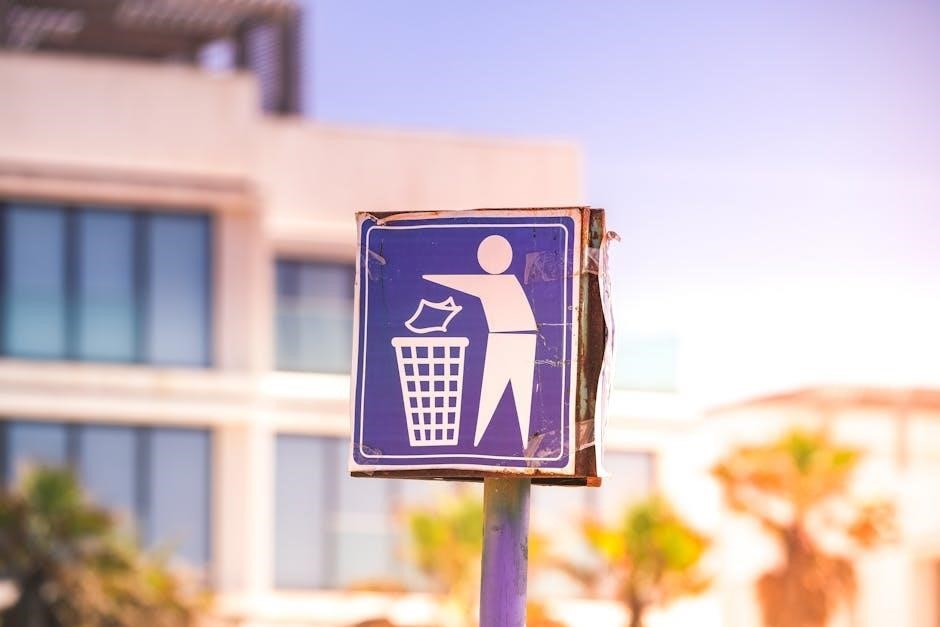Property management involves overseeing daily operations of residential, commercial, or industrial properties, ensuring tenant relations, repairs, and financial management are handled efficiently to maximize property value and maintain smooth operations.
1.1. Definition and Scope of Property Management
Property management is a specialized service overseeing the daily operations of residential, commercial, or industrial properties. It involves tenant relations, property maintenance, and financial tasks to ensure properties are well-maintained and profitable. The scope includes managing leases, handling repairs, and ensuring legal compliance. Property managers act as intermediaries between owners and tenants, focusing on maximizing property value and maintaining tenant satisfaction; Their role is essential for preserving the integrity and profitability of real estate investments.
1.2. Importance of Property Management
Effective property management is crucial for maintaining property value, ensuring tenant satisfaction, and optimizing rental income. It reduces risks associated with legal non-compliance, tenant disputes, and property damage. By handling day-to-day tasks, property managers allow owners to focus on investment growth. Proper management also enhances tenant retention, ensures timely rent collection, and maintains the property’s condition. Ultimately, it serves as a bridge between owners and tenants, fostering a positive relationship and maximizing the property’s potential for long-term success and profitability.
1.3. Key Skills Required for Property Managers
Property managers need strong communication and interpersonal skills to handle tenant relations and disputes. They must also possess organizational and time management abilities to juggle multiple tasks. Attention to detail is crucial for preparing lease agreements and maintaining records. Financial acumen, including budgeting and accounting, is essential for managing expenses and ensuring profitability. Additionally, they must stay updated on legal requirements and have problem-solving skills to address maintenance issues and tenant complaints effectively. Leadership and negotiation skills are also vital for managing teams and vendors.

Core Duties of Property Managers
Property managers oversee tenant relations, handle repairs, and manage finances while ensuring compliance with laws and maintaining property value through effective day-to-day oversight and strategic planning;
2.1. Tenant Management and Relations
Property managers are responsible for fostering positive tenant relationships, ensuring open communication, and addressing concerns promptly. Key duties include screening applicants, preparing lease agreements, and handling complaints. They also manage rent collections, resolve disputes, and maintain tenant satisfaction to reduce turnover. Building trust and ensuring compliance with lease terms are crucial for fostering long-term tenant relationships and protecting the property owner’s interests.
2.2. Property Maintenance and Repairs
Property managers oversee the upkeep of properties, ensuring they remain safe and well-maintained. Key responsibilities include scheduling and managing repairs, conducting regular inspections, and addressing maintenance requests promptly. They work with contractors to resolve issues efficiently, ensuring compliance with safety standards. Proper maintenance not only preserves the property’s value but also enhances tenant satisfaction and reduces potential liabilities. Regular assessments help prevent minor issues from escalating into major problems.
2.3. Financial Management and Accounting
Property managers handle all financial aspects of properties, including rent collection, budgeting, and expense tracking. They ensure timely payments, manage cash flow, and prepare financial reports for property owners. Accounting duties involve maintaining accurate records, processing invoices, and ensuring tax compliance. Effective financial management maximizes profitability while adhering to legal and regulatory requirements, ensuring transparency and accountability in all transactions. This role is critical for maintaining the property’s financial health and achieving long-term investment goals for property owners. Proper accounting practices prevent discrepancies and ensure smooth operations.
Tenant-Related Responsibilities
Property managers serve as intermediaries between tenants and property owners, handling tenant relations, ensuring compliance with lease agreements, and maintaining tenant satisfaction and communication.
3.1. Tenant Screening and Selection
Tenant screening and selection are critical duties for property managers to ensure responsible occupancy. This involves background checks, credit history, rental history, employment verification, and criminal records. Property managers must assess applicants’ ability to pay rent and maintain the property. They also conduct interviews to evaluate tenant suitability. Ensuring compliance with fair housing laws is essential to avoid discrimination. The goal is to select tenants who will respect the property and meet lease obligations while maintaining a positive landlord-tenant relationship.
3.2. Lease Agreement Preparation and Management
Property managers are responsible for preparing and managing lease agreements, ensuring they comply with local, state, and federal laws. They draft contracts that outline tenant responsibilities, rent terms, and property rules. Lease agreements must be legally binding and tailored to the property’s specific needs. Managers also handle lease renewals and execute agreements with approved tenants. This process ensures compliance with fair housing laws and protects both tenants and property owners. Proper lease management is essential for maintaining tenant relations and avoiding legal disputes.
3.3. Handling Tenant Complaints and Issues
Property managers must address tenant complaints promptly to maintain positive relationships and ensure tenant satisfaction. They mediate disputes, investigate concerns, and resolve issues efficiently. This includes addressing maintenance problems, noise complaints, or lease violations. Effective communication and problem-solving skills are crucial to ensure tenant concerns are resolved fairly and professionally. By handling issues promptly, property managers foster a positive living environment and reduce potential legal disputes. Their role is to act as a mediator between tenants and property owners, ensuring all parties are satisfied with the outcome; This maintains tenant retention and overall property profitability;

Property Maintenance and Upkeep
Property managers oversee regular inspections, schedule repairs, and ensure properties remain safe and well-maintained. They handle landscaping and address maintenance issues promptly to protect the property’s value and functionality.
4.1. Regular Inspections and Assessments
Regular inspections are crucial for maintaining property condition and preventing potential issues. Property managers conduct routine checks to assess the state of buildings, grounds, and systems. These inspections help identify maintenance needs, safety hazards, and compliance gaps. By evaluating leased spaces and common areas, managers ensure adherence to lease terms and local regulations. Detailed reports from these assessments guide repair schedules and budget planning, ensuring properties remain safe, functional, and valuable. Regular oversight also prevents minor issues from escalating into costly problems.
4.2. Scheduling and Overseeing Repairs
Scheduling and overseeing repairs are essential duties for property managers to maintain property condition and tenant satisfaction. Managers coordinate with contractors to address maintenance needs promptly, ensuring minimal disruption to tenants. They monitor repair progress, verify quality, and confirm completion. Proper documentation of all repairs is maintained for record-keeping and budget tracking. By efficiently managing repairs, property managers prevent issues from escalating and ensure properties remain safe, functional, and attractive, preserving their value and appeal to current and potential tenants.
4.3. Landscaping and Grounds Maintenance
Property managers are responsible for maintaining the exterior appearance of properties, including lawns, gardens, and common areas. They ensure regular landscaping tasks such as mowing, pruning, and planting are performed to enhance curb appeal and property value. Managers also inspect grounds for issues like overgrown vegetation or damaged structures and arrange necessary repairs. Seasonal decorations and exterior lighting are often coordinated to improve aesthetics. By collaborating with landscaping contractors, property managers ensure grounds are well-maintained, creating a welcoming environment for tenants and visitors while preserving the property’s long-term value.
Financial Responsibilities
Property managers handle rent collection, budget management, and tax compliance, ensuring accurate financial records and timely reporting to property owners while maintaining profitability and adherence to legal standards.
5.1. Rent Collection and Payment Processing
Property managers are responsible for rent collection and ensuring timely payments from tenants. They prepare and distribute invoices, monitor due dates, and handle late payments. This involves maintaining accurate records of all transactions and ensuring compliance with legal and financial regulations. Managers also process payments, update accounting systems, and manage security deposits. Effective communication with tenants and property owners is crucial to resolve any payment issues promptly. This duty ensures a steady cash flow and maintains positive tenant-owner relationships while adhering to financial obligations.
5.2; Budgeting and Expense Management
Property managers handle budgeting and expense management to ensure properties operate within set financial limits. They create detailed budgets, allocate funds for maintenance, and monitor expenditures to avoid overspending. This involves analyzing spending patterns, identifying cost-saving opportunities, and adjusting budgets as needed. Effective budgeting ensures profitability and quality standards. Regular financial reviews help track expenses, make informed decisions, and optimize resource allocation, aligning with financial objectives and stakeholder expectations.
5.3. Tax Compliance and Reporting
Property managers must ensure tax compliance and accurate financial reporting. They handle tax-related responsibilities, including preparing and filing necessary documents, ensuring adherence to local, state, and federal regulations. This involves tracking income, deductions, and credits, as well as maintaining records for audits. Compliance with tax laws minimizes legal risks and ensures financial transparency. Regular reporting to property owners and tax authorities is essential, providing clear insights into property performance and financial status, while maintaining trust and accountability.

Marketing and Advertising
Property managers oversee property listings, advertising strategies, and online marketing to maximize visibility, attract tenants, and maintain competitive market positioning, ensuring properties are showcased effectively to potential renters or buyers.
6.1. Property Listing and Advertising
Property listing and advertising are critical duties, involving the creation of attractive and detailed property descriptions. High-quality images and virtual tours are essential for showcasing properties online. Managers utilize various platforms like real estate websites, social media, and local directories to maximize visibility. The goal is to attract potential tenants by highlighting key features and amenities. Effective advertising strategies ensure properties are marketed to the right audience, reducing vacancy periods and attracting qualified tenants. Regular updates and monitoring of listings are vital to maintain accuracy and appeal.
6.2. Showings and Open Houses
Property managers organize and conduct showings and open houses to showcase properties to potential tenants. They ensure properties are clean and presentable, highlighting key features. Scheduling viewings, providing detailed information, and addressing inquiries are essential tasks. Open houses attract multiple prospects, fostering competition and reducing vacancy. Managers must also ensure safety and security during these events, verifying visitor identities and securing the property afterward. Effective communication and follow-up with interested parties are crucial to convert viewings into lease agreements, ensuring a smooth tenant acquisition process.
6.3. Online Marketing Strategies
Property managers employ online marketing strategies to attract tenants and maximize property visibility. This includes creating high-quality property listings with detailed descriptions and photos, utilizing platforms like property websites, social media, and rental portals. SEO techniques are applied to improve search rankings, while targeted ads reach specific demographics. Virtual tours and 3D walkthroughs are also used to showcase properties remotely. Regularly updating listings and monitoring online inquiries ensures timely responses, enhancing the chances of securing qualified tenants and minimizing vacancy periods effectively.

Legal and Compliance Responsibilities
Property managers must ensure compliance with local, state, and federal laws, including Fair Housing regulations. They draft and enforce lease agreements and handle legal disputes or evictions.
7.1. Understanding Local, State, and Federal Laws
Property managers must stay informed about local, state, and federal laws governing real estate, tenant rights, and property operations. This includes fair housing laws, eviction procedures, and environmental regulations. Compliance ensures legal adherence, avoiding penalties and disputes. Managers must interpret and apply these laws in daily tasks, such as lease agreements and tenant screening. Staying updated on legal changes is crucial to maintaining compliance and protecting the interests of both owners and tenants. Proper legal knowledge helps prevent violations and ensures smooth property management operations.
7.2. Ensuring Compliance with Fair Housing Laws
Property managers must ensure compliance with Fair Housing Laws, which prohibit discrimination based on race, gender, disability, familial status, or other protected characteristics. This involves avoiding discriminatory practices in tenant screening, lease agreements, and advertising. Managers must train staff to recognize and prevent bias, ensuring equal treatment for all applicants. Adherence to non-discriminatory rental criteria and documentation of decisions helps maintain legal compliance and avoids potential lawsuits. Regular updates on fair housing regulations are essential to uphold these standards and protect tenant rights effectively.
7.3. Managing Evictions and Legal Disputes
Property managers must handle evictions and legal disputes professionally, ensuring compliance with local, state, and federal laws. This involves documenting lease violations, preparing necessary legal paperwork, and coordinating with attorneys. Managers must enforce lease terms fairly while protecting the property owner’s interests. Effective communication and record-keeping are crucial to minimize disputes and potential litigation. By adhering to legal procedures, property managers can resolve conflicts efficiently, maintaining positive relationships and safeguarding the property’s value. Legal compliance and strategic oversight are essential in such sensitive matters.

Risk Management and Safety
Property managers ensure safety and mitigate risks by securing property insurance and conducting safety inspections. They prepare for emergencies and maintain compliance with safety regulations to protect assets and occupants.
8.1. Property Insurance and Liability Coverage
Property managers are responsible for ensuring properties are adequately insured against risks like damage, theft, or liability claims. They must assess insurance needs, secure appropriate coverage, and maintain policies to protect owners and tenants. Liability coverage is crucial to address potential legal issues, such as accidents on the property. Managers also review policy terms, ensure compliance with legal requirements, and handle claims to minimize financial losses. This ensures the property is safeguarded and all stakeholders are protected from unforeseen events or disputes.
8.2. Conducting Safety Inspections
Property managers conduct regular safety inspections to identify and mitigate potential hazards on the property. These inspections cover buildings, grounds, and systems to ensure compliance with safety standards and regulations. Managers check for fire safety equipment, electrical issues, and structural integrity to prevent accidents. They also address tenant-reported concerns and document findings to prioritize repairs. This proactive approach helps maintain a safe environment, reduce liability risks, and ensure the property remains habitable and secure for all occupants.
8.3. Emergency Preparedness and Response
Property managers must develop and implement emergency preparedness plans to address natural disasters, fires, or other crises. This includes training staff, coordinating with local authorities, and conducting regular drills. They ensure clear communication channels for tenants and maintain emergency contact lists. Managers also secure necessary supplies and document protocols for quick response. Regular reviews and updates to the plan are essential to adapt to new risks and ensure tenant safety. Effective emergency management minimizes damage and ensures swift recovery, protecting both people and property.

Administrative and Record-Keeping Duties
Property managers maintain accurate records, including tenant agreements, maintenance logs, and financial statements. They ensure compliance with legal standards and prepare detailed reports for property owners and stakeholders.
9.1. Maintaining Property Records
Maintaining accurate and detailed property records is crucial for effective management. This includes tracking lease agreements, tenant information, maintenance logs, and financial transactions. Property managers must ensure all documents are up-to-date and securely stored. Proper record-keeping helps with compliance, audits, and resolving disputes. It also provides a clear overview of property performance, enabling data-driven decisions. Accurate records are essential for transparency and accountability, ensuring smooth operations and fostering trust between owners, tenants, and management teams.
9.2. Preparing Reports for Owners
Property managers are responsible for preparing detailed reports for property owners, providing insights into financial performance, occupancy rates, and maintenance activities. These reports typically include income statements, expense breakdowns, and tenant occupancy status. Regular updates ensure owners are informed about their investment’s status. Reports may also highlight maintenance needs or tenant issues requiring attention. Clear and concise reporting helps owners make informed decisions and ensures transparency in property management activities. Accurate documentation is essential for fostering trust and accountability between managers and property owners.
9.3. Managing Vendor and Contractor Relationships
Managing vendor and contractor relationships is a critical duty of property managers. This involves selecting reliable vendors, monitoring their performance, and negotiating contracts to ensure cost-effectiveness and quality. Property managers must also ensure that vendors comply with regulations and maintain proper documentation. Building strong relationships with contractors helps streamline repairs and maintenance, ensuring timely resolution of issues. Effective communication and clear expectations are key to fostering long-term partnerships that benefit both the property and its owners, preventing potential disputes and ensuring seamless operations.

Communication and Stakeholder Relations
Effective communication is vital in property management, ensuring clear interactions with tenants, owners, and vendors. This fosters positive relationships, addresses concerns promptly, and aligns everyone with property goals.
10.1. Communicating with Property Owners
- Effective communication with property owners is crucial to align management strategies with their goals.
- Property managers must provide regular updates on property performance, tenant issues, and financial status.
- They ensure owners are informed about legal requirements, lease renewals, and maintenance needs.
- Open dialogue helps in addressing concerns promptly and making data-driven decisions.
- This fosters trust and ensures the property is managed in the owner’s best interest.
10.2. Building Relationships with Tenants
Building strong tenant relationships is essential for property managers to ensure tenant satisfaction and long-term occupancy. This involves addressing tenant concerns promptly, maintaining open communication, and fostering a positive living environment. Property managers should also provide clear guidelines and expectations to tenants, ensuring they understand their responsibilities. By being responsive and professional, managers can build trust, reduce turnover, and create a mutually beneficial relationship. Effective tenant relations directly impact property value and operational success.
10.3. Collaborating with Local Authorities
Property managers must collaborate with local authorities to ensure compliance with regulations and maintain community relations. This includes adhering to zoning laws, safety codes, and environmental standards. Managers often work with local officials to address issues like waste management, noise control, and public health. Building positive relationships with authorities helps resolve disputes efficiently and ensures properties meet all legal requirements. This collaboration not only avoids penalties but also contributes to the overall well-being of the property and its tenants, fostering a harmonious living or working environment.
Effective property management is crucial for maximizing property value and tenant satisfaction. It requires balancing tenant relations, maintenance, and financial tasks while adapting to industry trends and challenges.
11.1. Summary of Key Responsibilities
Property managers are responsible for overseeing daily operations, ensuring properties are well-maintained, and maximizing their value. Key duties include tenant management, handling repairs, and financial oversight. They also manage lease agreements, enforce compliance with laws, and maintain records. Effective communication with tenants and owners is crucial, alongside budgeting and tax compliance. Additionally, they handle marketing, legal disputes, and safety measures. Their role bridges owners and tenants, ensuring smooth operations and profitability while addressing all aspects of property care and stakeholder relations.
11.2. The Future of Property Management
The future of property management lies in integrating advanced technology and sustainable practices to enhance efficiency and tenant satisfaction. Automation and AI will streamline operations, while eco-friendly initiatives will become standard. As the demand for professional management grows, property managers must adapt to these changes, ensuring compliance and optimizing property values. Staying ahead of industry trends will be crucial for long-term success in this evolving landscape.
11.3. Final Thoughts on Effective Property Management
Effective property management is the cornerstone of maintaining profitable and harmonious real estate investments. It requires a balance between tenant satisfaction, property upkeep, and financial efficiency. By fostering strong relationships with tenants and owners, property managers ensure long-term success. Adaptability to industry changes and leveraging technology will drive future growth. Ultimately, the role of a property manager is vital in safeguarding investments and enhancing property value, making it a cornerstone of the real estate sector.

